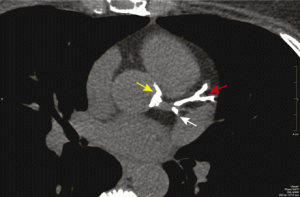 I want to explain to you exactly what is a coronary calcium scan. Many will not have heard of it but those who have, may have had one of these tests done. The test gives a score of the likelihood of getting heart disease. The higher the score, the more chance of having a heart event.
I want to explain to you exactly what is a coronary calcium scan. Many will not have heard of it but those who have, may have had one of these tests done. The test gives a score of the likelihood of getting heart disease. The higher the score, the more chance of having a heart event.
This image shows severe calcification of the left anterior descending coronary artery (red arrow). The portion of the circumflex coronary artery within the imaging plane (white arrow). The aortic root around the origin of the left main coronary artery (yellow arrow).
Cholesterol Problem? No, Calcium problem!
Arterial plaque slowly increases as we age, but it does not have to be this way. Excessive intake of calcium (Ca) is a real problem in this day and age. What’s worse, it is the elderly who seem to be given the most Ca supplements. They are told to drink plenty of milk and products with Ca in them such as yoghurts. Much of these foods are also fortified with Ca by the food manufacturers.
Is 99% of calcium in your bones?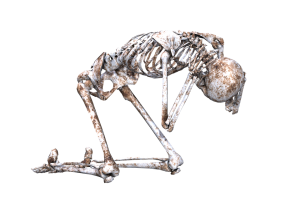
Not all of your Ca supplement will be going into your bones. Excess will be deposited into your soft tissue and you have no idea where in your body it will settle. Our modern diet has excessive Ca in it. Consequently, a Ca supplement to augment an already plentiful Ca level is unnecessary and dangerous.
Arterial plaque is a calcium problem
If you know that too much Ca is wreaking havoc on your body, you can do something about it. If nobody tells you of the dangers of this excess, how are you supposed to know, you’re not a doctor. But you do expect your own doctor to tell you about dangerous excesses or deficiencies. Sadly, this doesn’t often happen, unless your allopathic doctor is also a naturopath.
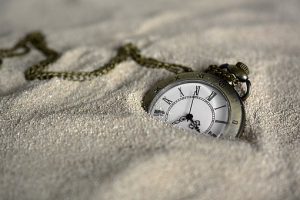 Slowly turning to stone
Slowly turning to stone
Over time, your Ca supplement is slowly turning into rock inside your body. These little rocks are floating around and settling in all kinds of places. We talk about the heart more than any other part of the body because it is our most important organ or muscle. However, we must not forget other important parts of the body. In fact a Ca deposit anywhere except in the bones and teeth is not desirable.
Don’t blame cholesterol!
Most people including doctors, blame cholesterol for a build up of fatty plaques. But the truth is the majority of the plaques are calcified. Cholesterol is waxy and soft and does not actually harden the arteries on its own. Ca, on the other hand, acts like concrete and hardens the arteries, impairing their ability to be pliable.
Exactly what is a coronary calcium scan
The Mayo Clinic describes it as follows: “A heart scan, also known as a coronary calcium scan, is a specialized X-ray test that provides pictures of your heart that can enable your doctor to detect and measure calcium-containing plaque in the arteries.”
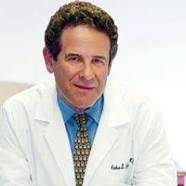
A group of cardiologists in the 1980s, led by a Dr Arthur Agatston, devised a way to determine the amount of coronary calcium within the arteries. They used electron beam computed tomography, known commonly as ultrafast CT scan.
How much Ca or the density of the Ca is measured in Hounsfield units using the Hounsfield scale. This entails the weighed score multiplied by the area of the coronary calcification. This provides the Ca score and is known as the Agatston score.
What is a Coronary Calcium Scan Score
A patient with a high Ca score will be more likely to have significant narrowing and stiffening of the coronary arteries. The severity of which can only be surmised. But common sense predicts that the higher the calcium score the higher the risk of a heart event.
A patient with a low Ca score will be much less likely to have severe stiffening or narrowing of the coronary arteries than the higher scoring patient. Even so, despite a low score, patients can still succumb to cardiovascular events but these incidences will be rarer.
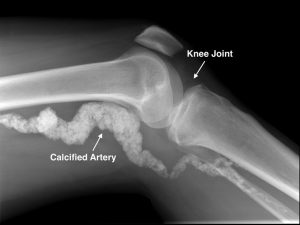 What about the rest of the body?
What about the rest of the body?
A high coronary calcium score, would also indicate Ca deposits throughout the rest of the body. Kidney stones, gall stones, osteoporosis, heel spurs, periferal artery disease etc. could be lurking. This image shows a calcified artery in the leg.
Coronary Calcium Score Interpretation
Below are the definitions used to relate the coronary calcium score:
- Zero = No identifiable plaque. Risk of coronary artery disease very low ie. <5%
- 1-10 = Mild identifiable plaque. Risk of coronary artery disease low ie. <10%
- 11-100 = Definite, at least mild atherosclerotic plaque. Mild or minimal coronary narrowings likely.
- 101-400 = Definite, at least moderate atherosclerotic plaque. Mild coronary artery disease highly likely. Significant narrowings possible.
- >400 = Extensive atherosclerotic plaque. High likelihood of at least one significant coronary narrowing.
Official interpretation advises that age and gender should be considered. This implies that it is accepted the older generation will slowly calcify. This acceptance or foregone conclusion is a crime in my mind. If anyone of any age has a risk, then that patient should be educated. Advice about prevention or even reversal of the situation should be available to everyone. Presumption and even exacerbating excess Ca in the older body is unacceptable. Medics need to learn about the dangers of excess Ca instead of encouraging supplementation, which will inevitably compromise the patient’s health, in many areas.
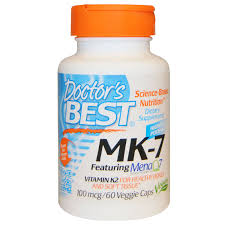 Pharmaceutical drugs such as Statins, will likely be offered to those at risk, (or even those that aren’t at risk). But, appropriate nutritional supplements can be more beneficial. Also they will not inflict a toxic burden on the body like drugs do. According to research, supplements such as Magnesium, Vitamin K2 (MK7), hormone (vitamin) D3 and Vitamin C, can actually reverse calcifications. On the other hand, drugs will at best maintain the condition, but rarely reverse or cure it and at worst aggravate any disease.
Pharmaceutical drugs such as Statins, will likely be offered to those at risk, (or even those that aren’t at risk). But, appropriate nutritional supplements can be more beneficial. Also they will not inflict a toxic burden on the body like drugs do. According to research, supplements such as Magnesium, Vitamin K2 (MK7), hormone (vitamin) D3 and Vitamin C, can actually reverse calcifications. On the other hand, drugs will at best maintain the condition, but rarely reverse or cure it and at worst aggravate any disease.
A word about statins?
If you knew exactly what statins did to your body, you would think twice about taking this drug. Many of my friends and family, have been put on statins. This despite the fact that they have never had a heart event. It’s just not worth the risk of the side effects. Thankfully, two of my relatives have refused statins. I worry about friends and relatives taking everything their doctor gives them without question. The sooner we stop our love affair with doctors and the pharmaceutical industry, the better!
Are you on statins?
For those who have had a heart attack or other heart related problems, statins will be on their drug list. Statins are known to deplete CoQ10 (ubiquinol). Has your doctor prescribed ubiquinol to take with your statin? Is your liver being regularly tested for increased liver enzymes? How is your mental acuity? Do your muscles hurt?
 Independent research has shown that there is no proof that statins even work. But the side effects can be damaging. The majority of the research that enthuses about the merits of statins, will have been done by companies that sell the drug. Research done by companies on behalf of a drug company should also be viewed with suspicion.
Independent research has shown that there is no proof that statins even work. But the side effects can be damaging. The majority of the research that enthuses about the merits of statins, will have been done by companies that sell the drug. Research done by companies on behalf of a drug company should also be viewed with suspicion.
Magnesium (natural) versus Statins (multi billion dollar drug)
Statins are a multi billion dollar profit drug for the pharmaceutical industry and profits are their top priority, not safety. What statins actually do is inhibit an important enzyme (HMG CoA reductase). Magnesium, on the other hand, is a natural regulator of this enzyme which controls the production of cholesterol. So why would you use a drug to deactivate this enzyme. The body has a perfectly good natural way of controlling it. If you do have high cholesterol levels, perhaps you’re deficient in magnesium! Your vitamin K2 may be low and perhaps you live in area without much sun, so you may need a D3 supplement. Remember, cholesterol is vital for your body. If it’s too low it could cause problems, including mental acuity and demyelination. Did you know the brain is 60% fat!
Todays ultrafast spiral CT scan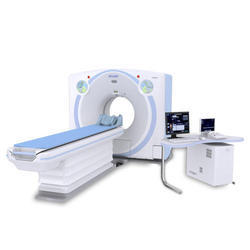
Today the ultrafast spiral CT is being used to evaluate coronary calcium. This is a technique which is very fast with scanning times taking around 10 seconds. The patient does not need to prepare for the scan. Fasting is not necessary. However, patients are often asked to refrain from smoking and ingesting caffeine drinks before the scan.
Radiation is a consideration
The radiation involved with the CT scan is a consideration especially if multiple scans have been done previously. There may be an increased radiation induced cancer risk with repeat procedures.
 A change of lifestyle
A change of lifestyle
Treatment of individuals with high calcium scores should aim at reducing risk. A change of lifestyle is critical. This includes a no junk food/drink diet, regular exercise, quitting smoking and limiting alcohol intake.
Using supplements
Equally important is balancing vital nutrients. Taking vitamin K2(MK7) and magnesium will help usher calcium from soft tissue back to the bones. Once your magnesium levels are replete, consider being tested for D3 to make sure you don’t over supplement. Vitamin C, which we can’t make in our bodies, should be regularly taken. These are 4 nutrients which I think are vital but, of course, there are many more to consider including the B complex.
Watch that calcium intake
Taking a ruck of supplements can be a pain, but do consider carefully what you eat and take the most vital nutrients for your body. Do be careful with Ca, it is so easy to take too much. This means researching for yourself and working with your medic rather than letting him control what you ingest without question. Educate your doctor on nutrition!
Doctors of the future
 The best doctors are those that have been trained in allopathic medicine as well as naturopathic treatments. They will only prescribe a drug if it’s absolutely necessary and will try and treat you using nutrients. Pharmaceutical drugs are to be avoided if at all possible.
The best doctors are those that have been trained in allopathic medicine as well as naturopathic treatments. They will only prescribe a drug if it’s absolutely necessary and will try and treat you using nutrients. Pharmaceutical drugs are to be avoided if at all possible.
Spread the word!
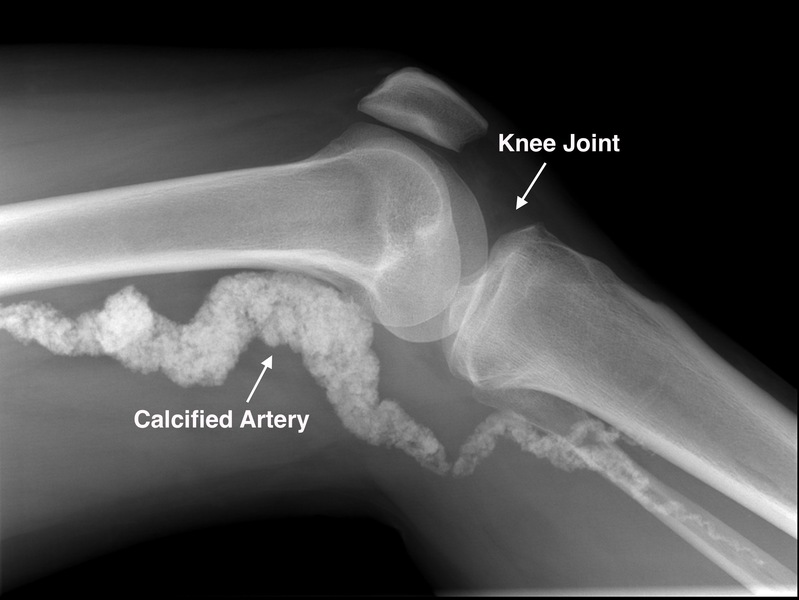
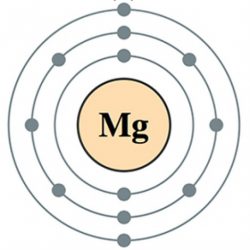
Wow Chessie!
I am so glad I came across your website, especially this article on what happens to our bodies when we get too much calcium in our diet.
The x-ray pictures really brought to light the damage it can do to our health. As a newly turned sixty year old, (oh my goodness, am I really that old?) I am always interested in finding out information like you give in this article.
I took nutrition as a secondary in College, but things have changed so much since then. I try to keep up with everything, and with the internet now it is much easier to do. I am a retired Dental Hygienist, and as such, I was required to give nutritional counseling to all my patients in order to help stop dental decay and get them on a better diet.
Since I am retired now, I will have to keep up on things for myself instead of relying on continuing education classes. You are so very right about the Doctors not getting much education on nutrition, but I was blessed enough to find a Doctor who will listen to me and take my information on nutritional healing to heart, and include it in his treatment planning on me. He’s one in a million though.
Anyway, great info, keep it up, your website is now on my list of “must reads”. Thanks, Angi
Thanks for your informative reply Angi, I am presuming you are in the US but if you are by any chance in the UK, do you know of those dental practices that do Safe Mercury Amalgam Removal Technique (SMART). I am trying to make a list of those that can be recommended in the UK.
As for those x-ray pictures, they are pretty scary aren’t they. You are really lucky to have found a doctor that’s willing to listen to you about nutritional alternatives. Many doctors are scared they will be reprimanded for offering alternative advice instead of prescribing drugs. Their hands are really tied here in the UK and in most other countries including the US and Canada. Unfortunately, the pharmaceuticals have so much influence in how doctors are taught, it is definitely detrimental to patients’ health. Thanks for your kind comments and good health to you.
I’m really glad I came across this article, I seriously never knew that there could be a relation between calcium deposits and heart disease! And also didn’t know that taking too much calcium can be bad for you?!
With heart disease in my family, I am constantly worried that I might have a heart attack, then I go to a GP, they never do any scans, but always assure me that I’ll be fine. I will definitely consider requesting a coronary calcium scan, just for extra peace of mind!
Hi there AP and thanks for your input. Heart disease can be in any family who have not got the right balance of nutrients, especially these two vital minerals. You can take action now and start moving any excess Ca from your tissues back into your bones. Vitamin K2(MK7) will do the job along with Mg and Vitamin D3. This combination will start to protect your heart and arteries right now, before any calcification starts.
If you have calcification already, this is not what your doctor will prescribe. He will likely put you on medication which will further deplete Mg and could make matters worse, but never cure or reverse the condition. Have your scan if you want to, but no matter what the result is, taking these nutrients is your best bet, either to reduce calcification or stop it from forming. If you live in a sunny area then you may not need D3 but vitamin K2 and Mg are generally depleted in the population as a whole, no wonder heart disease is the biggest killer!
Thank you for another quality article. I have really taken a liking to your posts and how important magnesium is for our bodies. I did not, however, realize the detrimental effects of calcium. I just thought we were supposed to drink a lot of milk to keep our bones strong. The calcification in the human body is pretty amazing, something, like you said, I wasn’t aware of. Is a coronary calcium scan something that is done at a certain age? Or is this something you can ask your doctor to see if they will do a scan?
As I said to Anxiety Panda, a scan needn’t be done for you to proceed protecting yourself. If the scan shows you do have calcification then you will be prescribed a drug or even offered an operation. Much better to use the nutrients you need to either reduce your calcification or stop it from forming in the first place.
I’m not sure that a scan is done at a certain age. It is more likely to be used to confirm a suspicion of calcified plaque and help with a diagnosis.
Unfortunately, doctors are not taught about nutrition. Medical education is controlled by the pharmaceutical companies who deal in controlling conditions with lucrative drugs. Ask any MD how much nutritional education they had in medical school. It’s not their fault but some are willing to buck the trend and go the naturopathic route. This is the doctor of the future, one that can use allopathic medicine if it’s the only answer but lean towards using natural nutrients that our bodies need to keep healthy.
You could try educating your doctor about K2 etc., but good luck with that! If doctors do not follow protocol which involves prescribing drugs, they can be seriously reprimanded or worse struck off.